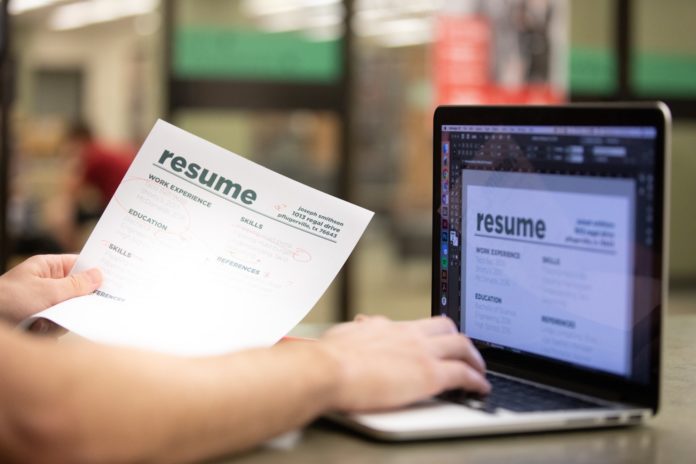By Caroline Yablon | Reporter
Business students who interned at sought out companies like Southwest Airlines, Dell and Accenture enlightened a room of students with takeaways from their internships as part of the “Successful Interns Workshop” hosted by the Professional Development Program (PDP) last week in the Paul L. Foster Campus for Business and Innovation.
The workshop ran as a Q&A. South Lake senior Clark Parr, who is on the leadership team for the PDP, was the host.
Parr asked juniors and seniors a series of questions about their internships and helped turn their experiences into advice for the audience.
Some valuable advice that the students shared in the discussion is how to differentiate from other applicants and interns. Advice included having an extensive knowledge on the company the student is interviewing for, starting the process of looking for an internship before junior year, seeking mentorship, responding to feedback given by an employer and investing in professional business attire.
Houston junior Abraham Lipets interned for Owens Corning –– a global company that develops and produces insulation, fiberglass and roofing composites. He said a way to differentiate from other applicants in the interview process is to spend five to ten minutes looking at the company’s website to see what they do, what industries they are involved in and how they operate. According to Lipets, this is a great way to form questions to bring up in the interview.
“Never ask the question, ‘what do you do?’ during an interview — it never looks good,” Lipets said.
San Juan Capistrano, Calif., senior Mark Richards interned for Accenture. He said students should start scoping out companies during freshman year to avoid being unable to find an internship or job junior or senior year.
“I’ve had the experience of going to career fairs my freshman year, and that has been fruitful for me,” Richards said.
Heath senior Lexi Greenhill interned for Dell this past summer and Southwest Airlines last semester. She said seeking mentorship impacted her internship tremendously and suggested seeking mentorship from employers while interning for a company. Greenhill found a mentor at both of her internships and was able to talk to around 60 employees of both companies to gain an insight on their job and experiences working for the company.
“A huge take away for mentorships is that mentors can come in all shapes and sizes. You can get different pieces of everyone from anyone, and you just have to be professional, but you can also be vulnerable and real and make these connections with people until you find someone that you have a general connection with. You can talk to them and pursue that relationship and you will definitely benefit from it,” Greenhill said.
Lipets said being able to take feedback from an employer and doing something with that is huge. He said he would make an action plan on how to improve himself from the feedback he received on his performance. With that, he would ask to share his plan on how to improve as well as ask questions on the feedback he received from his employer. Lipets said this tactic shows to an employer that the intern is coachable, which is what they are looking for in a new employee.
Parr ended the Q&A with a brief synopsis of what to wear for an interview: 1. stick with dark colors and solids –– navy, black, grey; 2. wear an unwrinkled white or light blue shirt; 3. stay conservative with the color of tie, it should not be distracting and make sure that the tie is the correct length –– it should hit the length of man’s belt; 4. when it come to shoes and belts, they should always match; 5. as for socks, this is a man’s opportunity to let his personality come out.
“Please don’t wear black or white athletic socks — it does not go unnoticed. It looks sloppy as well,” Parr said.
Some other key advice that Parr highlighted for men were: a man’s suits should always be tailored –– if it does not fit, he said it gives a bad impression every time, and always make sure the colors of outfit coordinate and always make sure to look clean – get a haircut, shave, etc.
Parr said his boss told him if he ever walks into an interview and the interviewee’s suit is wrinkled or their shoes are not shined, it’s an automatic no for him.
As for ladies, Oakland N.J., senior Cassandra Smith, who interned for GM Financial, said students should always be overdressed for the interview. Ladies should wear a blazer and pants, a blazer and a skirt or a professional dress. For shoes, girls are not required to wear heels — she said stick to a comfortable shoes. Smith does not recommend trying out a new pair of heels on the day of the interview. As for accessorizing, she advises ladies do not wear big loud jewelry because it can be distracting.
“As for business casual, that can range a lot for women, which is why you should talk to a recruiter to get a good idea for what business casual means for them if that company does allow it,” Smith said.
Students who may need assistance with business professional attire can stop by the “Career Closet” provided by the Office of Career & Professional Development located in the West Wing of the Sid Rich Building. They provide students with new/gently used business attire to students free of charge.






